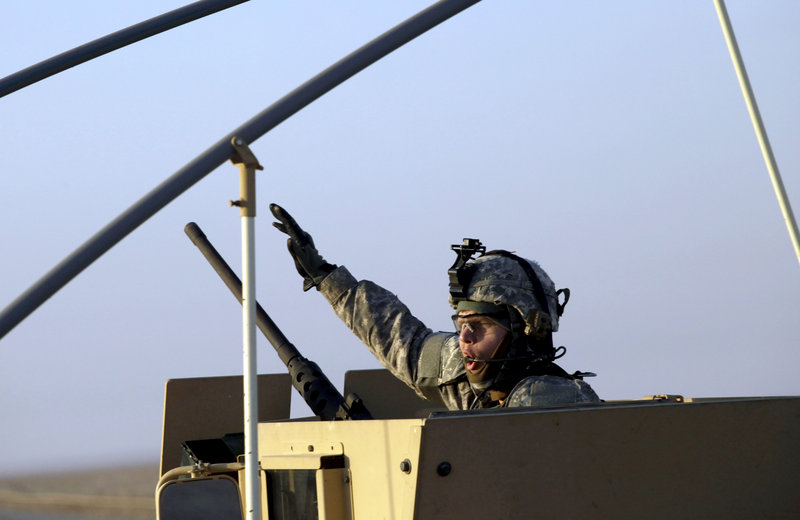AT THE IRAQ-KUWAIT BORDER – Outside it was pitch dark. The six American soldiers couldn’t see much of the desert landscape streaming by outside the small windows of their armored vehicle. They were hushed and exhausted from an all-night drive — part of the last convoy of U.S. troops to leave Iraq during the final moment of a nearly nine-year war.
As dawn broke Sunday, a small cluster of Iraqi soldiers along the highway waved goodbye to the departing American troops.
“My heart goes out to the Iraqis,” said Warrant Officer John Jewell. “The innocent always pay the bill.”
When they finally crossed into Kuwait, the mood inside Jewell’s vehicle was subdued. No cheers. No hugs. Mostly just relief.
His comrade, Sgt. Ashley Vorhees, mustered a bit more excitement.
“I’m out of Iraq,” she said. “It’s all smooth sailing from here.”
The final withdrawal was the starkest of contrasts to the start of the war, which began before dawn on March 20, 2003. That morning, an airstrike in southern Baghdad, where Saddam Hussein was believed to be hiding, marked the opening shot of the famed “shock and awe” bombardment. U.S. and allied ground forces then stormed from Kuwait toward the capital, hurtling north across southern Iraq’s featureless deserts.
The last convoy of heavily armored personnel carriers, known as MRAPS, left the staging base at Camp Adder in southern Iraq in Sunday’s early hours. They slipped out under cover of darkness and strict secrecy to prevent any final attacks. The 500 soldiers didn’t even tell their Iraqi comrades on the base they were leaving.
The attack never materialized. The fear, though, spoke volumes about the country they left behind — shattered, still dangerous and containing a good number of people who still see Americans not as the ally who helped them end Saddam’s dictatorship, but as an enemy.
About 110 vehicles made the last trip from Camp Adder to the “berm” in Kuwait, the long mound of earth over which tens of thousands of American troops charged into Iraq at the war’s start.
Once they crossed into Kuwait, there was time for a brief celebrations as the soldiers piled out of the cramped and formidable-looking MRAPs. A bear hug, some whooping, fist bumps and fist pumps.
The war that began eight years and nine months earlier cost nearly 4,500 American and more than 100,000 Iraqi lives and $800 billion from the U.S. Treasury. The bitterly divisive conflict left Iraq shattered and struggling to recover. For the United States, two central questions remain unanswered: whether it was all worth it, and whether the new government will remain a steadfast U.S. ally or drift into Iran’s orbit.
But the last soldiers out were looking ahead, mostly, and not back. They spoke eagerly of awaiting family reunions — some of them in time for Christmas — and longing for Western “civilization” and especially the meals that await them back home.
The 29-year-old Vorhees was planning a Mexican dinner out at Rosa’s in Killeen, Texas. Her favorite is crispy chicken tacos. Another joy of home, she said: You don’t have to bring your weapon when you go to the bathroom.
In the last days at Camp Adder, the remaining few hundred troops tied up the loose ends of war, or at least those that could be tied up.
The soldiers at the base spoke often of the “lasts” — the last guard duty, the last meal in Iraq, the last patrol briefing. Even the last Friday was special until it was eclipsed by the last Saturday.
Spc. Brittany Hampton laid claim to one of the most memorable “lasts.” She rode the last vehicle of the last convoy of American troops leaving Iraq.
Hampton was thinking of her dad, also a soldier who has served four tours in Iraq and Afghanistan.
“I can’t wait to … call my dad and tell him about this,” she said. “He’s not going to believe it. He’s going to be so proud of me.”
She joked that no one was going to believe her back home when she told them she was in the very last vehicle to leave.
“But we really, truly were the last soldiers in Iraq,” she said.
In the final days, U.S. officials acknowledged the cost in blood and treasure was high, but tried to paint it as a victory — for both the troops and the Iraqi people now freed of a dictator and on a path to democracy. But gnawing questions remain: Will Iraqis be able to forge their new government amid the still stubborn sectarian clashes? And will Iraq be able to defend itself and remain independent in a region fraught with turmoil and still steeped in insurgent threats?
President Obama stopped short of calling the U.S. effort in Iraq a victory.
“I would describe our troops as having succeeded in the mission of giving to the Iraqis their country in a way that gives them a chance for a successful future,” Obama said in an interview with ABC News’ Barbara Walters, recorded Thursday.
Send questions/comments to the editors.



Success. Please wait for the page to reload. If the page does not reload within 5 seconds, please refresh the page.
Enter your email and password to access comments.
Hi, to comment on stories you must . This profile is in addition to your subscription and website login.
Already have a commenting profile? .
Invalid username/password.
Please check your email to confirm and complete your registration.
Only subscribers are eligible to post comments. Please subscribe or login first for digital access. Here’s why.
Use the form below to reset your password. When you've submitted your account email, we will send an email with a reset code.